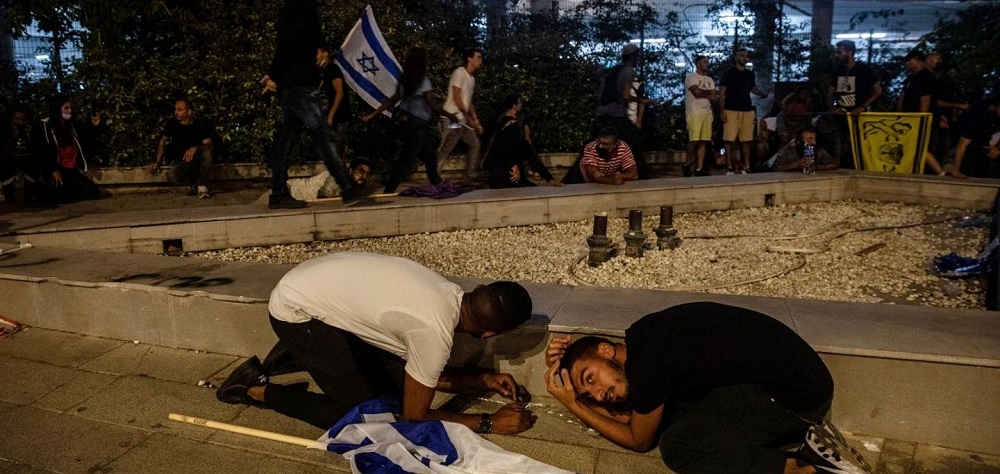Alwaght- Amid mounting clashes between the Palestinians and the Israeli forces in the West Bank especially Jenin Camp, the provocative desecration of the holy Al-Aqsa Mosque by the Israeli settlers and possible Flag Day march by them in the coming days have increased the tensions level to a peak ahead of the last Friday of the holy month of Ramadan which marks the Quds Day.
Extremist Israeli settlers annually march in May to mark the 1967 occupation of eastern Al-Quds by the Israeli army from Jordan, and on their way to the Western Wall, which is the holiest Jewish place, they pass through Muslim neighborhoods in a largely provocative and insulting move.
These provocations, amid repeated warnings from the Gaza-based resistance groups, are risking a new Palestinian intifada. Hamas warned recently that "fingers are on the triggers."
The strong-toned warnings have caused the Israeli leaders to resort to international mediation to prevent a war.
According to a source in the Palestinian resistance, 150 phone calls were made in 48 hours by mediators such as Egypt, Qatar and the UN in order to prevent the situation in Al-Aqsa Mosque from developing into a new war, reported SAFA news agency.
This resorting to the international and regional mediators more than anything else demonstrates the depth of the Israeli confusion and fear of the consequences of a new conflict with the Palestinian resistance. But what are the factors that causing this Tel Aviv fear?
Political challenges of war for the Israelis
The Israeli political situation in recent years has been increasingly deepening, causing an internal gap among various parts of the government and crisis in the power distribution and transfer. This is, in turn, is indicative of the social situation in the Israeli society that is moving to divergence and lack of internal cohesion. This situation is obviously impacting the regime's political and social structures. The best proof to this claim is the four elections held within two years and the big failure to form stable governments in recent years.
The unstable political situation, one of the main causes of which is the security crisis and the frequent defeats of the Israeli army as the savior and support pillar of society from the resistance in Hamas in Gaza and Hezbollah in Lebanon, has made the shaky Israeli government to be cautious about a new war, though it propagandistically brags about its power to counter its Palestinian opponents.
Last week, the alarm bells were set off for Prime Minister Neftali Bennett’s government as an ally left the highly delicate coalition. Bennett is now on the line and any war will immerse the cabinet and Knesset into a devastating crisis.
The Israelis, on the other hand, are well aware that a new war with the Palestinians, triggered by their desecration of the holy Muslim sites, will strongly arouse ideological and religious tendencies among Muslims, boost Hamas's home and regional position, and mar the already stagnant Arab-Israeli normalization process.
Massive security and military challenges for Tel Aviv
Any fresh conflict will definitely bring the Israelis face to face with substantial security and military challenges from which it is hard to move out.
The first possible major security challenge for the Israelis in future conflicts with the Palestinians, whose emergence and expansion in recent years has been well visible, is the intifada by the Palestinians in the occupied territories, especially those living within 1948 borders. These are Palestinians that stayed at their homes after foundation of the Israeli regime in 1948.
During last year's clashes in Sheikh Jarrah neighborhood and the subsequent Operation Al-Quds Sword that lasted 11 days, one issue that was new to the history of long Palestinian struggle and undermined the Israeli home security was the rise of the Palestinians of 1948 borders.
Although the Israeli government imposed a heavy censorship regime to prevent news leaks, it failed. The outcome was a major wave of intifada sweeping through the occupied territories. The rise was effective and costly to Tel Aviv. For example, after the 11-day war, Israeli media claimed that scientist Avy Har Aven, the father of the Israeli rocket industry, suspiciously died. Media outlets later revealed that he was killed in an attack on his hotel by the Palestinians at the heart of the occupied territories.
Furthermore, the next war would be full of new surprises for Tel Aviv that would include use of "pinpoint accuracy" missiles targeting vital military and economic sites, drones used for surveillance and strikes, and man-portable air-defense systems. During the Israeli raids on Gaza military posts recently, Hamas showed off its new air defenses as a bombshell, signaling an upgrade in its military capabilities.



























